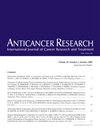自体血清源性细胞外小泡核酸药物在肿瘤转移中的应用
IF 1.7
4区 医学
Q4 ONCOLOGY
引用次数: 0
摘要
由于核酸的物理化学性质,其在体内高度不稳定,这是其临床治疗应用的主要障碍。因此,药物输送系统(DDS)的发展对于实现核酸在体内的稳定运输和促进有效的细胞摄取至关重要。特别是在癌症治疗中,能够靶向病变器官或肿瘤细胞的选择性递送技术对于最小化脱靶效应和减少不良事件至关重要。本文章由计算机程序翻译,如有差异,请以英文原文为准。
Application of Nucleic Acid Medicine Using Autologous Serum-derived Small Extracellular Vesicles for Cancer Metastasis.
Nucleic acids are highly unstable in vivo due to their physicochemical properties, presenting a major obstacle to their clinical application as therapeutics. Consequently, the development of drug delivery systems (DDS) is essential to enable stable transport of nucleic acids within the body and to promote efficient cellular uptake. In cancer therapy in particular, selective delivery technologies capable of targeting diseased organs or tumor cells are critical for minimizing off-target effects and reducing adverse events.
求助全文
通过发布文献求助,成功后即可免费获取论文全文。
去求助
来源期刊

Anticancer research
医学-肿瘤学
CiteScore
3.70
自引率
10.00%
发文量
566
审稿时长
2 months
期刊介绍:
ANTICANCER RESEARCH is an independent international peer-reviewed journal devoted to the rapid publication of high quality original articles and reviews on all aspects of experimental and clinical oncology. Prompt evaluation of all submitted articles in confidence and rapid publication within 1-2 months of acceptance are guaranteed.
ANTICANCER RESEARCH was established in 1981 and is published monthly (bimonthly until the end of 2008). Each annual volume contains twelve issues and index. Each issue may be divided into three parts (A: Reviews, B: Experimental studies, and C: Clinical and Epidemiological studies).
Special issues, presenting the proceedings of meetings or groups of papers on topics of significant progress, will also be included in each volume. There is no limitation to the number of pages per issue.
 求助内容:
求助内容: 应助结果提醒方式:
应助结果提醒方式:


